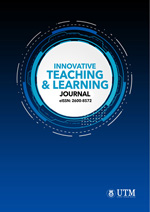The Effects of Digital Game-based Learning on Primary School Students’ English Vocabulary Achievement and Acceptance
Abstract
There is a wide range of theoretical support and previous research findings on the benefits of digital game-based learning as well as the benefits of interactive multimedia applications in learning English primary school vocabulary in an effort to provide a 21st century learning environment for the children of the digital generation. However, there is little evidence and consensus of empirical data support comparing the effectiveness of these two methods through inferential statistical analysis. Therefore, this study uses a quasi-experimental design which involves two groups; one group receives digital game-based learning (DGBL) method while another group receives interactive multimedia learning (IML) method. The rationale behind this research design is to identify the effectiveness of these two learning methods in influencing year four students’ vocabulary achievement as well as to identify the acceptance level of students towards digital games. A total of 70 year four students from one of the rural primary schools were selected. The total of 35 students from the experimental group experienced DGBL method while 35 other students from the controlled group experienced IML method. The finding shows that there is a significant difference that proves that the students who have been through DGBL teaching demonstrate better English vocabulary than those who are taught using IML method. In addition, DGBL students also reported good level of acceptance towards the use of digital game in the classroom based on questionnaires distributed. This finding shows that digital game-based learning method have the potential to be a solution to the problem pertaining to low performance or vocabulary mastery among primary school children in Malaysia especially in rural areas.
















